Last Updated: February 27, 2026
So you’ve decided to create a website and start a blog, maybe as a creative outlet, but more likely as a way to build an income online, but how do you decide what to write about? Knowing how to choose a niche for a blog is important, yet it’s often one of the most difficult steps.
If you’re feeling stuck, you’re not alone. With millions of possible topics to choose from, that freedom can quickly turn into overwhelm. Too many options lead to second-guessing, procrastination, and sometimes complete decision paralysis.
In the worst cases, weeks go by without choosing a niche, and the blog never gets started at all.
So how do you move past that and choose with confidence?
In this guide, I’ll walk you through a simple framework to help you choose a blog niche that’s not only enjoyable but sustainable and strategically positioned for growth.
How to Choose a Niche For a Blog – A Simple 3-Step Framework
Choosing a niche isn’t just about picking a topic; it’s about choosing your lane in a crowded digital world. To build a successful blog, you need a clear focus that tells both Google and your readers exactly what you’re an expert in.
For me, the goal is always to build a sustainable, content-first business designed to grow over time, not a ‘quick-win’ site.
But this mindset didn’t come naturally to me.
When I first learned how to build a website several years ago and had the task of choosing my own niche, I completely panicked.
I couldn’t come up with a single idea. In fact, I struggled so much that I temporarily forgot what my own interests even were. Now, how on earth does that happen?
Looking back, I now recognise this as one of the most common beginner mistakes: trying to choose a niche without any structure or criteria to guide the decision.
That experience is what later pushed me to approach niche selection more strategically instead of emotionally. I realised that passion is vital, but it needs a system to survive.
The 3 Filters That Define a Profitable Blog Niche
This is where the framework comes in. Whenever I evaluate a niche idea, I run it through these three specific filters:
- Interest – Will you still enjoy writing about this in 6–12 months?
- Demand – Are people actively searching for information on this topic?
- Monetisation – Are there clear ways to earn from this niche long-term?
Think of these as your non-negotiables. While every blog has to start with a spark of interest, it’s the balance of all three that transforms a hobby into a business.
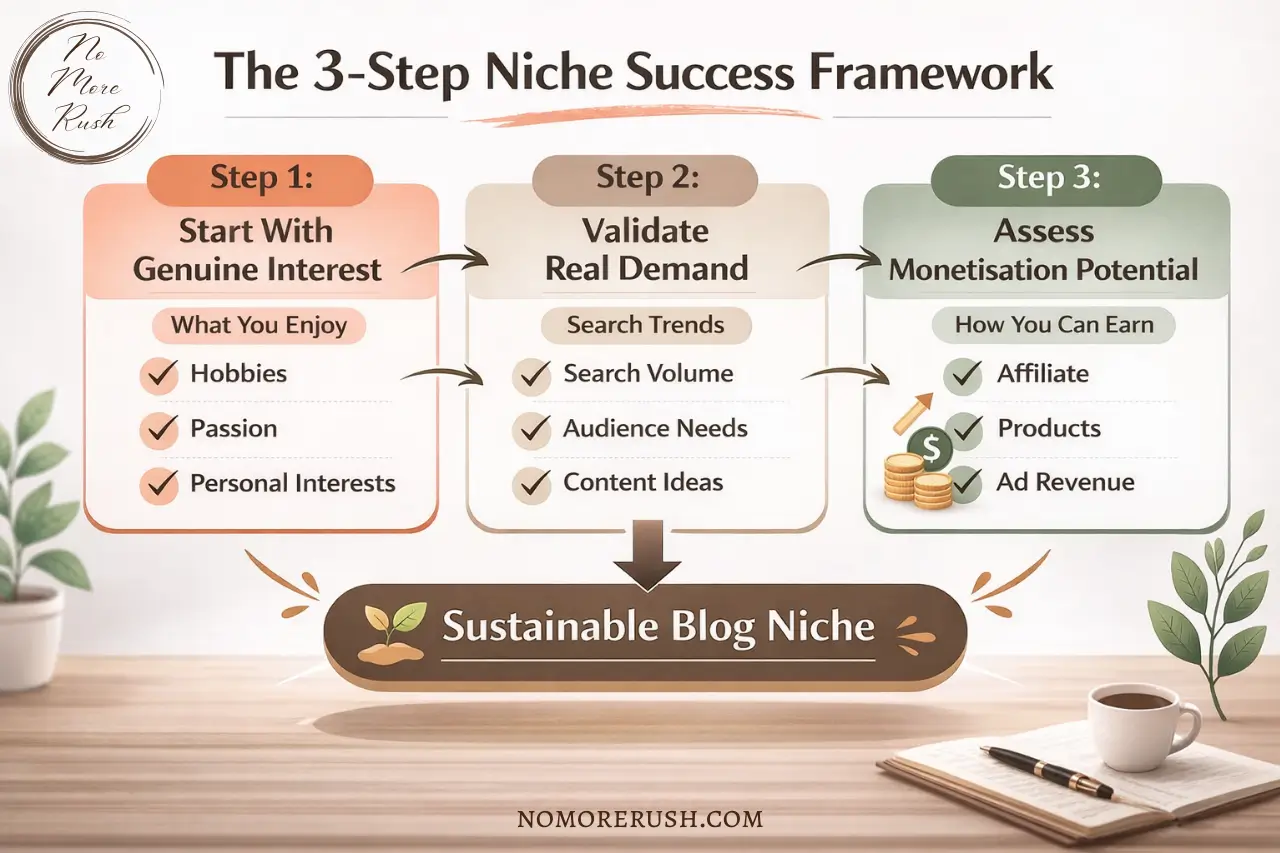
These three filters work together to shape a niche that’s sustainable, strategic, and built for growth. But while all three matter, they don’t all come into play at the same moment.
Every niche begins somewhere, and in the early stages, one filter naturally leads the way.
Before you validate demand or explore monetisation, you need a starting point. Something that makes you want to show up, create, and stay consistent long enough for the other pieces to fall into place.
That starting point is genuine interest, and that’s where we begin.
Step 1: Start With a Genuine Interest
The first filter in this framework is simple: choose something you genuinely care about and would enjoy writing about.
Building a blog takes time, and if you’re not interested in the topic, publishing consistently becomes difficult very quickly. Motivation fades, content ideas dry up, and what looked promising on paper starts to feel like a chore.
Interest is what keeps you showing up when traffic is slow, and results aren’t immediate. Without it, most blogs stall before they ever gain any momentum.
Don’t Choose a Niche Based on Profit Alone (Aka The Profit Trap)
If you want to build a blog with staying power, you have to look past the “quick wins.” I am generally cautious of niches that promise overnight success. In my experience, the most reliable niches are often the least “flashy” on the surface, but the most consistent over the long haul.
The most common mistake I see? Choosing a niche purely because it looks lucrative on paper.
Why That’s a Problem: When you aren’t genuinely interested in your topic, content creation quickly becomes an uphill battle. After the first few posts, the momentum slows because:
- Research feels like homework: You’ll find yourself dragging your feet to start every new draft.
- Content lacks depth: It’s hard to provide real value when you’re just summarising other people’s articles.
- Consistency dies: This is why so many blogs never make it past the 10-post mark.
Lessons from the Trenches: The “Fitness” Trap
When I started, I chose the Fitness niche because I personally work out and figured that was enough. I quickly realised that while I enjoyed doing the workouts, I actually dreaded writing about the science of hypertrophy or reviewing gym equipment for hours at a time. I had the ‘Experience,’ but I lacked the ‘Curiosity’ — a mistake that almost led me to quit blogging entirely. Before you commit, ask yourself: Is this just a hobby you enjoy doing, or a topic you could honestly research for the next two years?
The Reality Check: Sustainable blogs are rarely built on excitement alone; they’re built on consistent effort over time. That consistency is infinitely easier to maintain when you actually enjoy the topic you’re covering.
To put it another way, while the industry average for writing a post has shifted to roughly 3.5 hours (with AI adoption now common), the 12th Annual Blogger Survey by Orbit Media shows a massive correlation between effort and impact.
Bloggers who prioritise long-form, detailed articles (2,000+ words) are still far more likely to report ‘strong results’ than those sticking to surface-level content — proving that a niche you are genuinely interested in is the only way to sustain that level of deep-dive effort.
The Niche Viability Matrix: Balancing Passion with Market Data
To help you visualise where this effort meets opportunity, I’ve mapped out several popular niches using a Sustainability Score. This is my metric for how likely a solo creator is to survive the ’10-post slump’ based on market volatility versus personal interest.
Niche Viability Matrix: Balancing Passion with Market Reality
| Niche Category | Market Demand | Monetisation Potential | Sustainability Score | The “Passion” Requirement |
| Personal Finance | Extremely High | High ($$$) | Low | Requires deep technical accuracy; hard to stay motivated if you hate math. |
| Pet Wellness | High | Medium ($$) | High | Easy to write about if you love animals; high emotional reward. |
| Sustainable Living | Medium | Medium ($$) | Very High | Driven by personal values, content naturally evolves with your lifestyle. |
| Home Productivity | High | Medium ($$) | Medium | Great if you love organising, but requires constant “newness” to stay relevant. |
| Tech/AI Tools | Booming | High ($$$) | Low | Exhausting to keep up with unless you are a genuine “early adopter. |
Source: Data synthesised from 2025-2026 industry reports by Orbit Media (Blogger Trends), Statista (Market CAGR), and HubSpot (Creator Economy projections).
As the data shows, high-profit niches often come with a hidden ‘burnout tax.’ If you choose a path with a low sustainability score simply because the commissions are high, you are essentially betting against yourself.
Profitability is an engine, but Passion is the fuel.
Before picking a high-value niche like Finance or Tech, ask yourself: Could I write 100 articles on this without getting bored?
If the answer is no, the ‘Market Value’ doesn’t matter, because you’ll quit before you see a single cent of it. Use the table above as an example to ensure your passion has a path to profit, not to let profit dictate your passion
Once you’ve accepted that interest is your foundation, it’s time to actually find that ‘thing.’ If a specific idea hasn’t jumped out at you yet, don’t worry, most successful niches are hiding in plain sight.
Where to Look for Niche Ideas
If you’re unsure where to start, look at:
- Your hobbies
- Your regular activities
- Your profession or qualifications
- Skills you’ve taught yourself
- Topics you frequently search for online
Hobbies are often the easiest entry point. Gardening, photography, sports, crafts — even something as specific as accessorising your pet can become a niche.
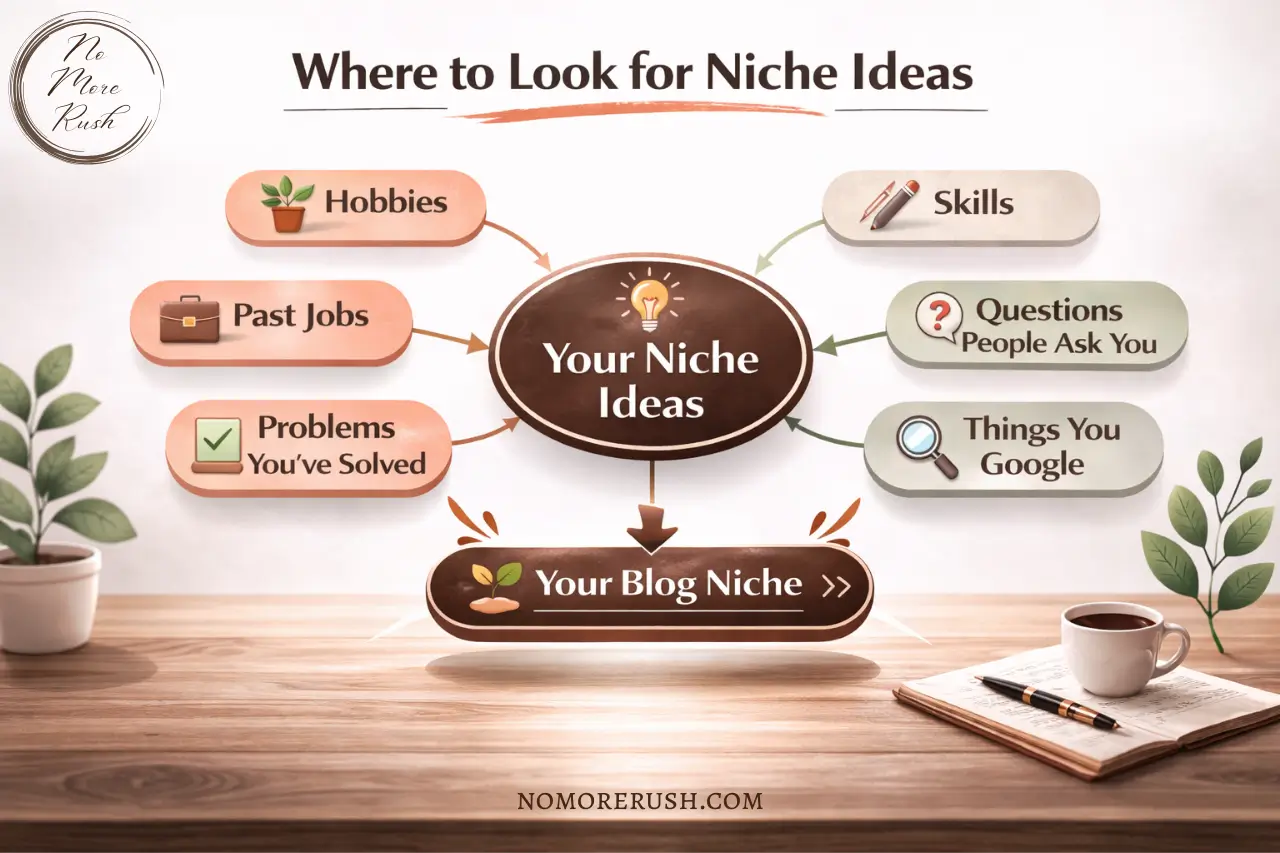
Here are some examples of the most popular niches for beginner bloggers:
- Gaming
- Makeup Tutorials
- Hair Tutorials
- Home DIY
- Cooking
- Arts and Craft
- Gym Workouts
Your profession is another strong option. Many blogs and YouTube channels are run by plumbers, hairdressers, bakers, mechanics, and other professionals sharing practical advice. That experience builds credibility.
You can also build around skills you’ve developed independently. Just be cautious with areas like medical, legal, or technical advice that require formal qualifications. Topics that can cause real-world harm if handled incorrectly should be avoided unless you’re properly trained.
The “Expert-Only” Exception
Topics like these fall under Google’s ‘YMYL’ (Your Money or Your Life) category. Google holds these topics to the highest possible standard because they can directly affect a reader’s well-being or financial security.
If you do choose a YMYL niche without the proper credentials, your content will struggle to gain any visibility because you’ll almost never outrank the giants, no matter how well-written it is.
Think of it this way, just because you’re a dab hand at fixing the electrics in your own home and haven’t blown the house up yet, doesn’t mean your unqualified advice isn’t going to blow someone else’s house up. That’s a bit of an extreme example, but you get the idea.
Try This Simple Interest Exercise
Open your search history and look for patterns.
What topics do you repeatedly research because these recurring searches often reveal genuine interest?
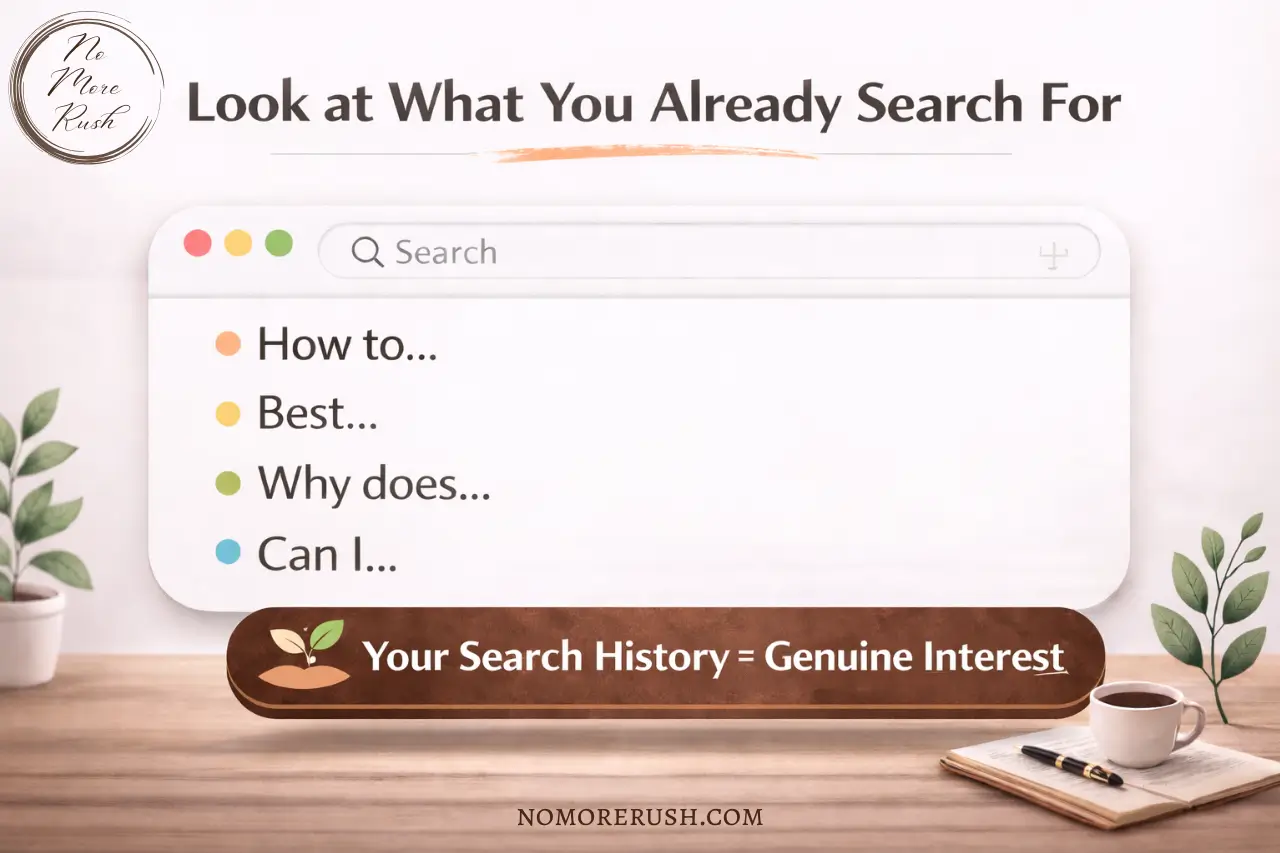
This is actually how I came to choose my very first niche, and it’s a pattern I now recommend to beginners because it naturally combines interest and demand.
If you’re repeatedly searching for something, it’s often because you’re trying to solve real problems, and real problems make excellent blog content.
At this stage, you’re not worrying about competition or monetisation. You’re simply identifying a topic you won’t get bored with after a month.
Once you have that topic, it’s tempting to start writing immediately. However, there is one more crucial layer to the ‘Interest’ filter. Before we look at demand, we have to make sure your chosen topic isn’t so massive that your voice gets lost in the noise.
Refine and Narrow Your Focus
One thing I’ve learned from building and analysing niche sites is that most beginners don’t fail because of a bad idea — they fail because their niche is too broad to compete in.
When you enter a wide, competitive niche, you’re going up against established brands with years of authority, backlinks, and content depth. As a new site, this makes it incredibly difficult to gain visibility, no matter how good your content is.
The “Narrow Down” Strategy: Finding Your Competitive Edge
If you’re wondering what’s considered too broad, think of something like the “Pet” niche. Trying to cover everything with paws or feathers is a recipe for fading into the digital background.
You might think narrowing it down to “Dogs” is enough, but in today’s landscape, even that is often too wide for a new site to gain authority. To really carve out a space, you need to go deeper into a specific sub-niche where you can become the go-to expert for a specific problem.
Try This Niche Litmus Test:
If your niche name is just two words (e.g., “Dog Grooming”), try to make it four or more.
- Broad: Dog Grooming.
- Niche: At-home grooming for nervous rescues.
In the example above, we’ve taken a broad niche like “Dog Grooming,” and turned it into “At-home grooming for nervous rescues.” Suddenly, you’re not just a blogger; you’re a lifeline for a specific group of owners who need expert, gentle guidance. That is a niche with true authority potential.
The Hidden Value in Hyper-Specific Niches
The reason this works isn’t just about avoiding big brands; it’s about finding the hidden pockets of high-value demand that those big brands often overlook.
For example, the Pet Health niche isn’t just a trend; it’s part of a projected $157 billion (2025) U.S. pet industry (American Pet Products Association). But if you try to rank for something like ‘best dog food,’ you’ll be buried.
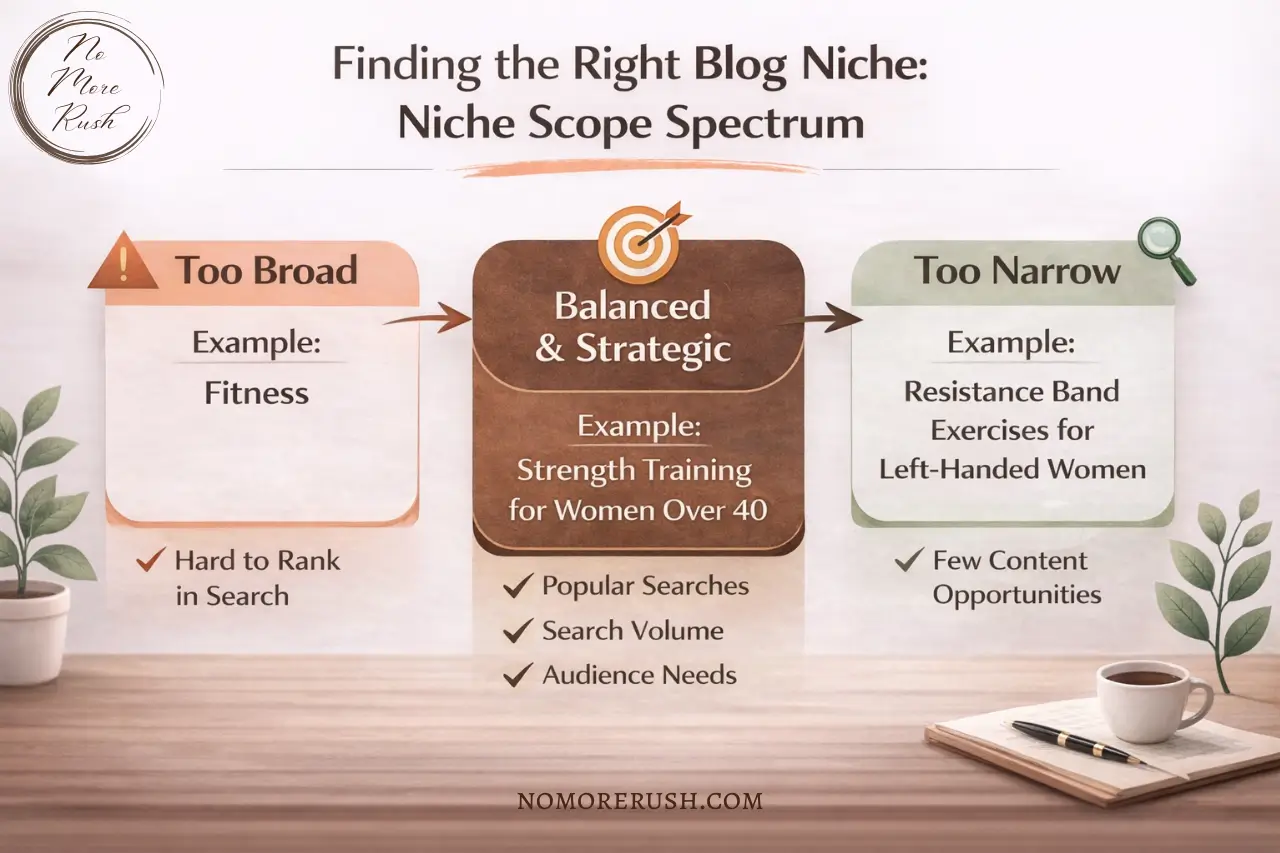
However, by focusing on a hyper-specific sub-niche like ‘Organic Pet Supplements for Senior Dogs,’ you aren’t just narrowing your topic, you’re tapping into high-margin affiliate programs and a growing ‘pet humanisation’ trend that currently outperforms standard pet food in terms of growth.
Maintaining Room to Grow
However, as you dive into these specific pockets, you have to be strategic.
Just be careful not to narrow your niche so much that you restrict your ability to create ongoing informational content.
The goal is balance — focused enough to be competitive, but broad enough to support long-term content growth and future expansion. This approach allows you to build topical relevance faster before expanding.
Once you’ve narrowed your focus to a realistically competitive sub-niche, the next piece of the puzzle is confirming that an audience actually exists.
Step 2: Validate Real Demand
Having an interest in a topic is important, but interest alone isn’t enough to build a successful blog. You also need to know whether there’s real demand for the type of content you want to create.
By demand, I simply mean: are people actively searching for information about this topic online?
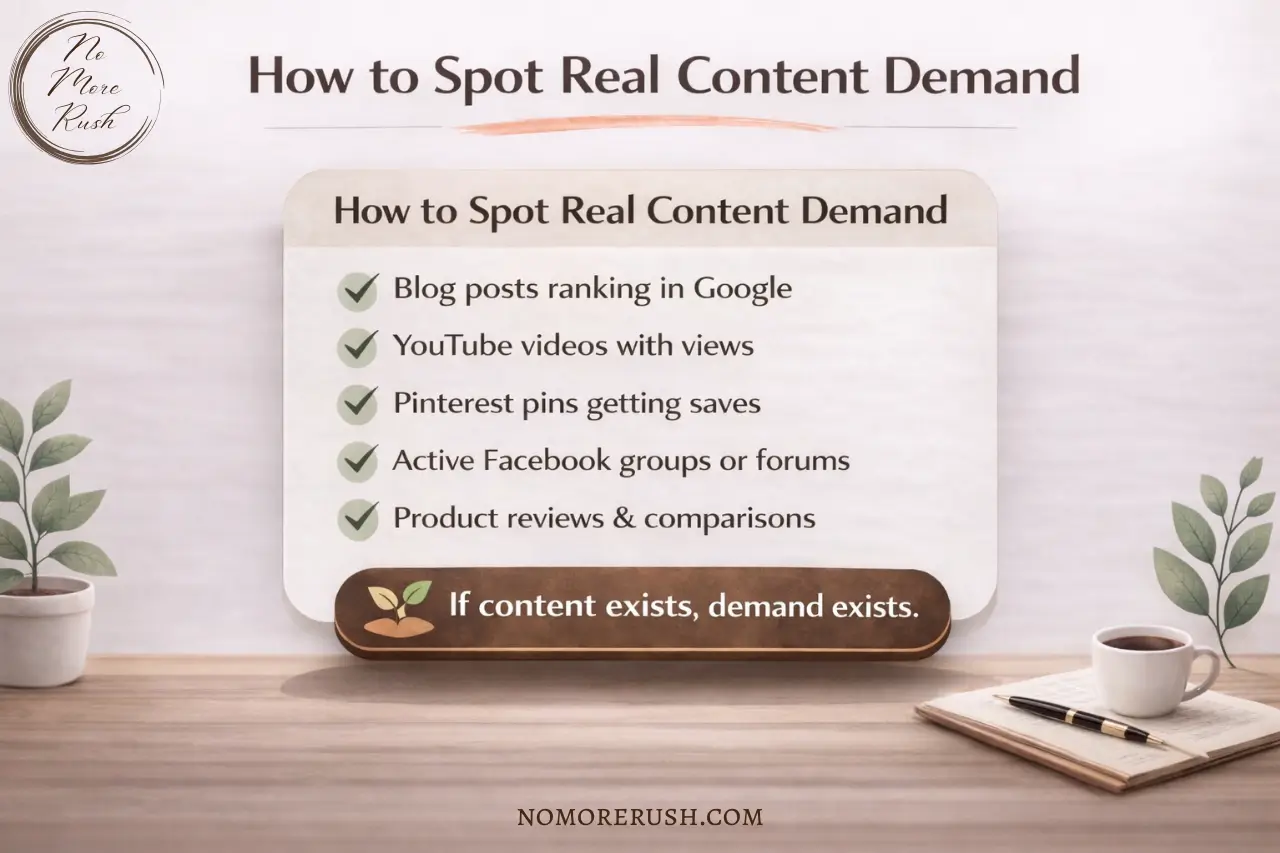
A great way to gauge this is to pay attention to what already exists. If people are searching for something, you’ll usually see:
- Blog posts
- YouTube videos
- Pinterest pins
- Forums or Facebook groups
- Product reviews and comparisons
If this type of content is present, then that’s a good sign; it means there’s an audience looking for answers.
How to Validate Demand (Without Overcomplicating It)
You don’t need expensive tools or deep SEO knowledge at this stage. Some very simple checks can give you a clear idea of whether a niche has potential.
Start with Google
- Type your niche idea into Google and see what comes up.
- Look at the autocomplete suggestions — these are real searches people are making.
- Scroll to the “People Also Ask” and “Related Searches” sections for content ideas.
If Google is showing lots of related questions and topics, that’s usually a strong indicator of demand.

For a more data-backed look, you can plug topics into Google Trends to see if interest in your niche is growing over time or if it’s just a passing fad.
If you want to see exactly what’s on your audience’s mind, head over to AnswerThePublic. By plugging in your niche or a specific sub-topic, you’ll get a ‘search cloud’ of the exact Who, What, Where, and Why questions people are asking.
It’s a fantastic way to see the sheer volume of curiosity surrounding a topic, and it confirms that there are real people on the other side of the screen looking for your expertise.
Look at What You Already Search For
While these free tools are great, don’t overlook the most powerful data source you have: your own search history. Just as we used this method earlier to pinpoint our interests, if you regularly search for information on a topic, chances are others are doing the same. This is often how beginners stumble onto great niche ideas without realising it.
Pro Tip: The “Repetitive Search” Signal:
If you find yourself Googling the same problem three times in one week, you haven’t just found a frustration — you’ve found a content gap. If you’re looking for that answer, thousands of others are too.
Just like me with my first niche, I didn’t start with keyword tools — I noticed I was repeatedly Googling the same type of information. That repetition was the demand signal I needed.
Check Content Volume (Not Just Popularity)
Seeing some competition is actually a good thing. A complete lack of content can be a red flag, but so can a niche dominated entirely by massive brands.
Ideally, you want to see:
- Blogs run by individuals, not just large companies
- Smaller YouTube channels and niche websites ranking
- Content that looks helpful but improvable
This suggests demand exists and that there’s room for you to compete. High competition isn’t automatically a deal-breaker, provided you can find a unique angle or an underserved audience. However, if every result is dominated by massive brands, it’s usually best to move on.
Demand and Content Potential Go Hand in Hand
It’s not just about whether people are searching — it’s also about whether you can create lots of helpful content around that demand.
Before committing to a niche, ask yourself:
- Can I realistically come up with 30–50 blog post ideas?
- Are there beginner questions, how-tos, comparisons, and problem-solving topics?
- Does this niche allow for growth and sub-topics over time?
If the answer is yes, that’s a strong sign you’ve found a niche with real demand and long-term potential.
However, a popular niche is only half of the success equation. To turn a blog from a time-consuming hobby into a sustainable business, you need to ensure that the audience you’ve found is actually looking to solve problems that involve products, services, or high-value information.
Step 3: Assess Monetisation Potential
This is the final piece of the puzzle. While I always advocate for passion and demand first, a niche must have a realistic path to revenue to be sustainable over the long term.
When evaluating a niche for profit, I’m not looking for a quick buck; I’m looking for Monetisation Depth. This means finding a topic that supports expert-led content while naturally opening doors to the ‘Big Three’ revenue streams.
A truly healthy niche shouldn’t rely on a single source of income; it should ideally have the potential for all of the following:
- Display Ads: High-volume informational traffic (e.g., ‘How to groom a nervous rescue’).
- Affiliate Marketing: Recommending physical or digital tools (e.g., ‘Best organic supplements for senior dogs’).
- Owned Products/Services: Creating your own solutions, like e-books, courses, or consulting (e.g., ‘The 4-Week Senior Dog Wellness Plan’).
If a niche can support all three, you aren’t just building a blog; you’re building a recession-proof business.
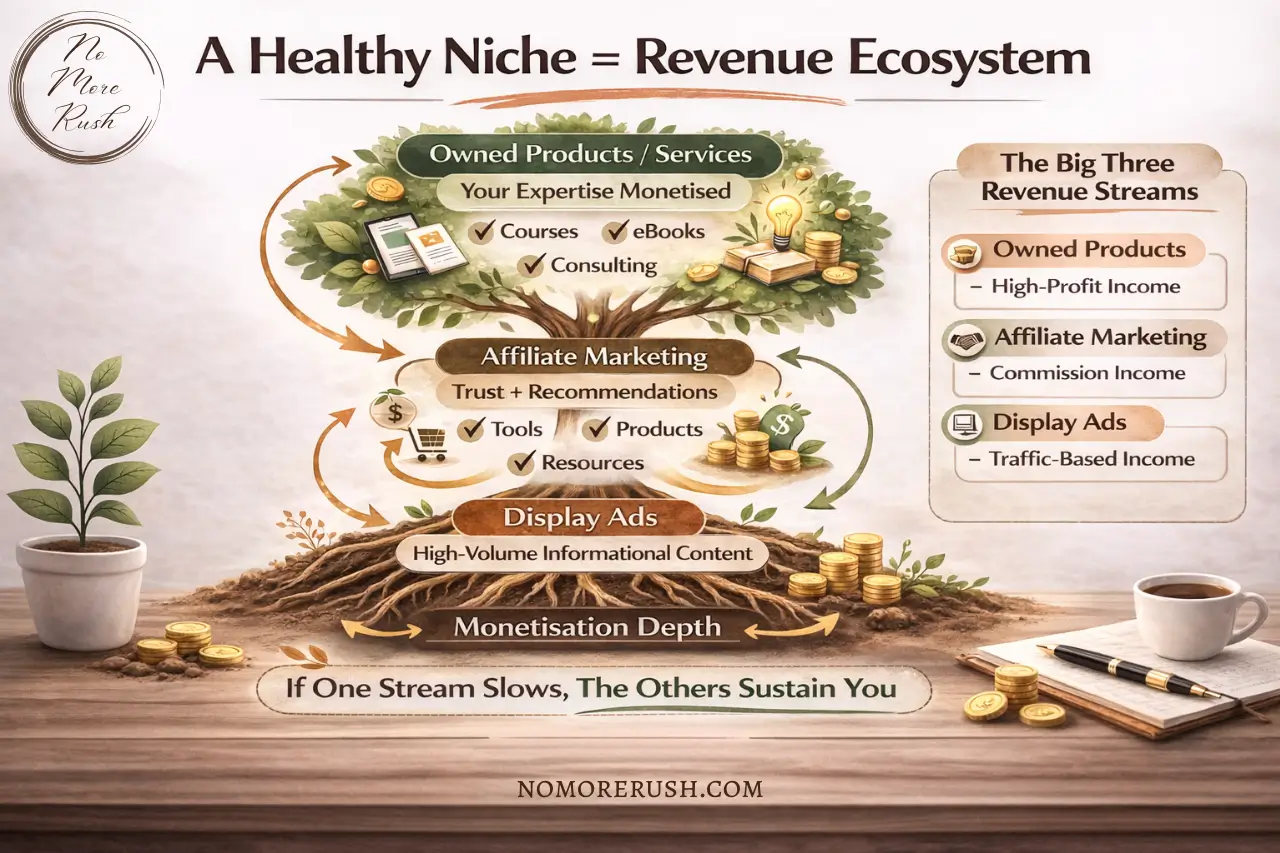
While most niches have the potential to check all these boxes, you shouldn’t just assume yours does. It’s vital to do the legwork now to discover the full extent of the products, services, and ad potential within your specific area.
So don’t make the mistake of leaving this step until you’re ready to monetise. Most successful niche websites plan monetisation early, even if they don’t implement it right away.
Evaluate Monetisation Quality
Beyond whether the revenue streams exist, I also look at the quality of monetisation opportunities within a niche, such as:
- Natural fit – Products that genuinely support the content rather than interrupt it
- Problem-solving – Products that help readers solve an issue they’re already researching
- Range – More than one type of product or price point, allowing flexibility over time
Here are some examples of the most obvious products that could be promoted from the niche examples I mentioned earlier:
| Niche Ideas | Standard Products (Affiliate) | High-Value / Digital Potential |
| Gaming | Consoles, Controllers, Headsets, Gaming Chairs, PC Components. | Gaming VPNs, Pro-Coaching Services, Digital In-Game Assets. |
| Photography | Cameras, Lenses, Lighting, Drones, Camera Bags. | Lightroom Presets, Online Courses, Software Subscriptions. |
| Hair Care | Hair Dryers, Straighteners, Luxury Shampoos, Extensions. | Virtual Consultations, Styling Courses, Subscription Boxes. |
| Home DIY | Power Drills, Tool Boxes, Workbenches, Ladders, Saws. | Project Blueprints, Carpentry Workshops, Design Apps. |
| Cooking | Blenders, Food Processors, Knife Sets, Cast Iron Skillets. | Meal Plan Subscriptions, Digital Cookbooks, Cooking Masterclasses. |
| Pets | Automatic Feeders, Grooming Kits, Specialty Food, Beds. | Pet Insurance, Online Training Programs, Vet-Consultation Apps. |
| Gym | Weights, Exercise Mats, Apparel, Supplements, Fitbits. | Personal Coaching, Workout App Subscriptions, Smart Gym Tech. |
A successful monetisation strategy doesn’t rely on constant ‘selling.’ Instead, your recommendations should naturally live within a strong foundation of informational content, like tutorials, comparisons, or troubleshooting guides.
By focusing on being a ‘Helpful Expert’ first, you align perfectly with Google’s Helpful Content Guidelines (E-E-A-T – Experience, Expertise, Authoritativeness, Trustworthiness). The goal is to create a site written primarily for users, where products are the solutions to their problems, not the reason for the page’s existence.
Consider Audience Buying Intent
Beyond just how you monetise, you need to consider when your audience is ready to reach for their wallet. A healthy niche attracts a mix of “Learners” (people seeking free info) and “Buyers” (people seeking solutions).
If a niche only attracts people looking for free tips with no “problem-aware” readers, you’ll struggle to convert traffic. Conversely, if you only target buyers, you’ll struggle to build trust. The goal isn’t to monetise every single click — it’s to monetise appropriately once you’ve established yourself as a reliable resource.
The “70/30” Rule: Balancing Help with Profit
It’s fantastic if a niche has massive profit potential, but you have to ask: Is there enough to talk about beyond the products?
A practical content mix guideline for affiliate-heavy sites suggests aiming for a ‘70/30′ balance: roughly 70% informational content (solving problems for free) and no more than 30% commercial content (helping people make a buying decision).
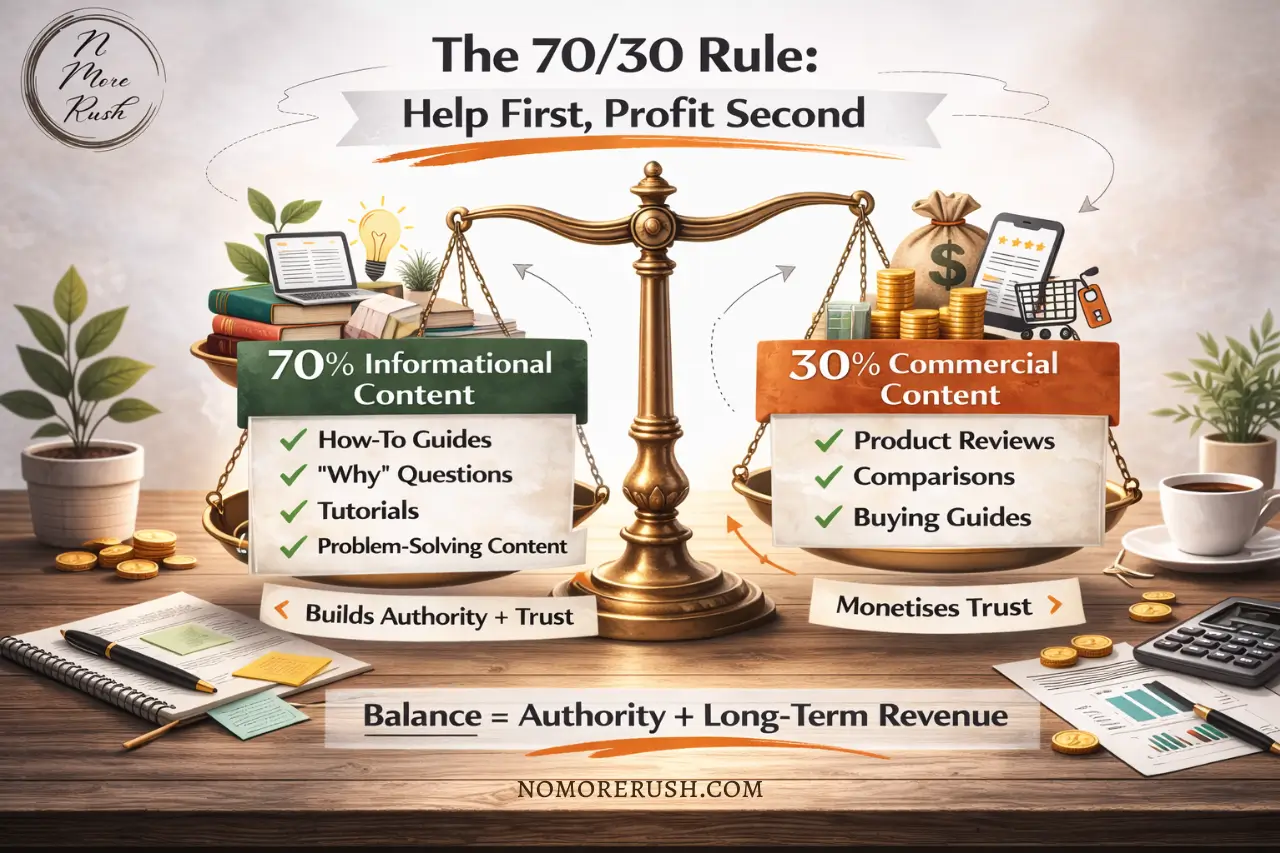
For most niches, this is the ‘sweet spot’ that Google rewards. However, if you are entering a YMYL (Your Money or Your Life) niche, like health, finance, or legal, you should play it even safer, aiming for closer to 80% informational content.
This ratio does two things: It builds Topical Authority by proving you understand the subject beyond just selling products, and it protects your site from being flagged as a ‘thin’ affiliate site.
From an SEO perspective, Google is much more likely to reward a site that genuinely educates its readers. Trust is the highest-converting currency you have, and if you lead with help, the sales will follow naturally.
The Takeaway: Before you commit, make sure your niche has enough “How-to” and “Why” questions to sustain that 70% informational bulk. If you can only think of five products to review and nothing to teach, your niche likely lacks the depth needed for long-term growth.
Use AI to Stress-Test Your Ideas
One of the most effective ways to see if a niche has “legs” is to use AI tools as a high-level strategist. This isn’t about letting a bot write your blog; it’s about pressure-testing whether your niche can realistically support the 70/30 content ratio over the long term.
This technique can also help to unlock “Un-nicheable” hobbies because many people feel their favourite pastimes aren’t “blog-worthy.”
You might think, “I enjoy drinking wine” or “I love going for long walks,” but struggle to see how that translates into dozens of articles. This is exactly where AI excels — it can help you move from a broad activity to specific, high-value expertise.
The Volume Check (Quick Start)
First, see if the niche is deep enough to sustain you. If you can’t envision at least 50 articles, you’ll run out of steam before you see results.
Try this simple prompt:
“I am starting a blog about [Insert Niche]. Give me a list of 30 varied content ideas that include beginner guides, ‘how-to’ tutorials, and product comparisons.”
If the AI produces a list that makes you think, “Oh, I could write a whole separate post about item #4,” you’re on the right track.
But before you start drafting, you need to filter these ideas for quality.
Pro Tip: The “5-Second Rule”:
If a question can be answered by an AI in 5 seconds (e.g., “What is the capital of France?”), don’t build a blog post around it. In 2026, the winning niches are built on Experience-Led Content — topics that require personal nuance, “boots on the ground” testing, or complex troubleshooting that a bot simply can’t replicate.
The “Strategic Audit” (Advanced Pro Prompt)
Once you know there’s enough to talk about, it’s time to dig deeper. This is where we move beyond simple topics and look at the business logic of your niche.
This “Stress-Test” prompt is designed to uncover the high-value insights most beginners miss:
- Risk Mitigation: Identifying “deal-breakers” before you invest months of work.
- AI-Resilience: Finding complex questions that a simple search summary can’t replace.
- Future Monetisation: Mapping out high-ticket products so you aren’t just relying on ad pennies.
Copy and paste this into Gemini or ChatGPT for a deeper look:
“I am considering starting a blog in the [Insert Niche] niche. My target audience is [Insert Audience]. Act as a ruthless business consultant and SEO expert. Tell me: 1) What are the 3 biggest risks of this niche in the next 2 years? 2) Can you list 10 informational ‘How-to’ or ‘Why’ questions this audience has that aren’t easily answered by a 5-second AI summary? and 3) What are 3 high-ticket digital products or services I could eventually offer?”
Evaluating the Results
When I ran that “Strategic Audit” on the drinking wine hobby, the shift was immediate. The AI moved past basic “how-to” tips and suggested angles like the climate impact on specific vintages and blind taste-test guides for budget-conscious collectors.

What initially seemed like a simple, “un-nicheable” hobby suddenly revealed multiple layers of high-value expertise. As you review your own AI output, ask yourself:
- Are the ideas genuinely useful? Do they solve real problems for real people?
- Is the content AI-resilient? Are these topics that require a human perspective or hands-on testing?
- Does it spark your own ideas? Does one AI suggestion make ten more ideas pop into your head?
If the AI struggles to give you 10 unique, deep-dive questions, the niche might be too “thin.” But if it generates a list of complex problems your audience is desperate to solve, you’ve likely found a winner.
Pro Tip: The Niche Tie-Breaker:
If you’re torn between several niche ideas, use this approach to compare them side-by-side. The niche that produces clearer, more expandable content themes is almost always the stronger choice for the long haul.
Used this way, AI becomes your ultimate brainstorming assistant — not the decision-maker, but a tool to help you evaluate whether your idea has real substance.
But even with the best tools, it’s easy to get tripped up by the “inner game” of blogging. Before you commit, let’s look at the five most common pitfalls that cause even the best niche ideas to fizzle out.
Common Beginner Mistakes to Avoid
Choosing a niche isn’t about finding a perfect idea — it’s about avoiding the hidden traps that cause most new sites to collapse before they ever reach a steady audience.
The Decisions That Derail New Blogs
The following pitfalls are incredibly common, especially in the early stages when everything still feels uncertain. Recognising them now will help you make clearer choices, stay consistent longer, and give your niche the time it needs to actually work.
1. Choosing a Niche Based on Income Claims Alone
One of the most common questions I hear is: “Should I just pick the niche that makes the most money?” It’s easy to be tempted by blog income reports or niche lists that promise quick wins.
The problem is that income potential on paper doesn’t translate well if you don’t enjoy the topic or understand the audience. In practice, this often leads to rushed content, weak engagement, and sites that are abandoned once results don’t come quickly.
2. Assuming Passion Equals Endless Content
You might wonder: “Is passion enough to sustain a blog?” The truth is, enjoying a topic doesn’t always mean it works well as a blog niche. Some interests are great hobbies, but don’t naturally generate enough questions, problems, or subtopics to support ongoing content.
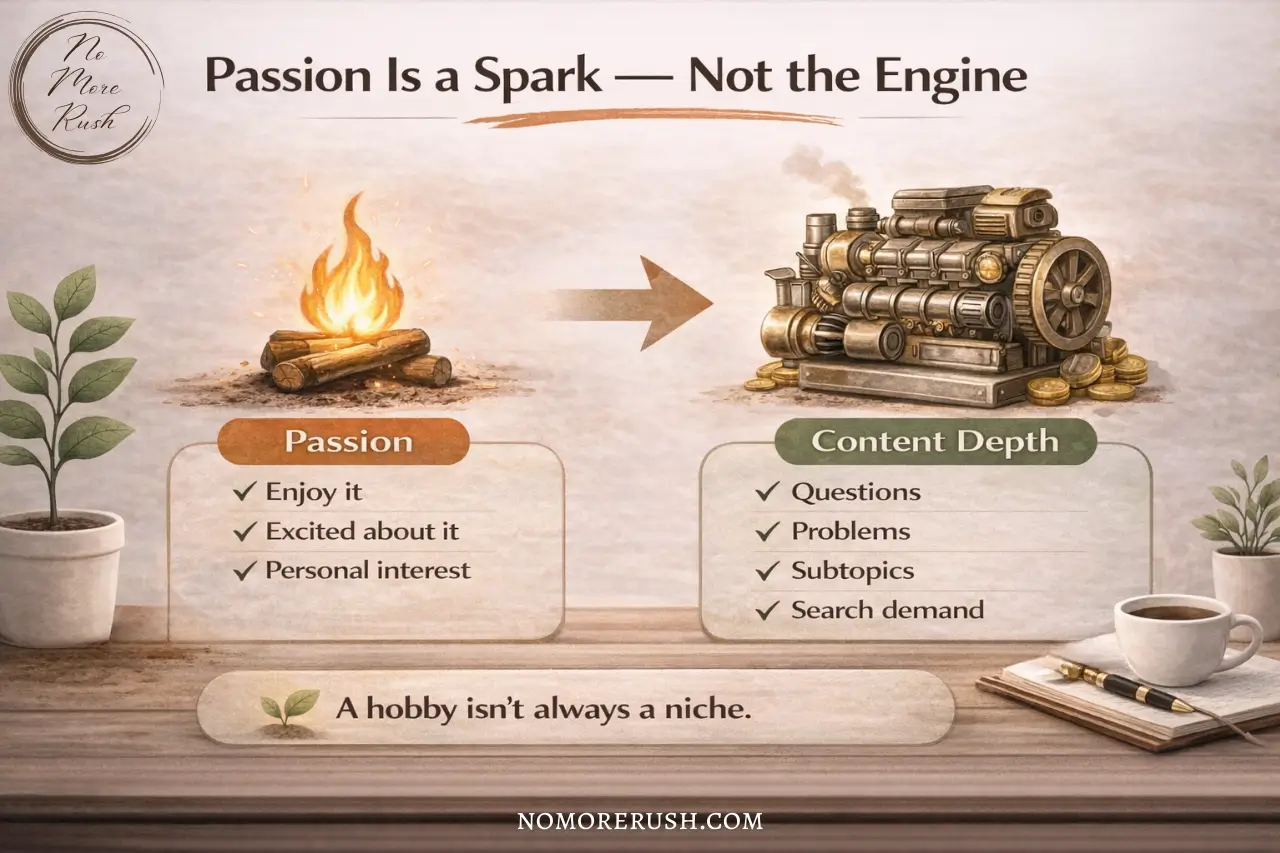
If you struggle to come up with blog ideas early on, that’s often a sign the niche may need refining, not forcing.
3. Going So Narrow That You Box Yourself In
While narrowing your focus is vital for SEO, you may worry: “Can a niche be too small?” The answer is yes. If you pick a topic that is too specific, you’ll eventually hit a “content ceiling” where there’s nothing left to write about and no room to expand.
A good niche should be focused enough to make you an expert, but flexible enough to grow with you. A quick rule of thumb: If you can’t brainstorm at least 50 unique informational topics today, your niche is likely too narrow. Aim for a “lane,” not a “parking spot”.
4. Expecting Immediate Validation
One of the most overlooked mistakes is expecting instant clarity or confidence the moment you pick a topic. “How long does it take to know if my niche is working?” is a question every blogger asks.
In reality, doubt is normal, especially in the early stages when traffic is low and feedback is nonexistent. In 2026, it can take six months or more for search engines to fully “understand” and trust a new site. Expecting a “win” in month one is the fastest way to quit a winning idea.
Many successful blogs only make sense in hindsight. Real progress comes from publishing, learning, and adjusting based on data, not from waiting for a “lightbulb moment” that tells you everything is perfect.
5. Treating Your Niche Choice as Permanent
Many beginners get stuck in analysis paralysis because they wonder: “Can I change my blog niche later if it isn’t working?” The fear of being “locked in” can stop you from ever hitting publish. In reality, a niche is a starting point, not a life sentence.
Most successful bloggers pivot at least once. Your first niche choice is actually a data-gathering mission; it provides valuable insight into what you enjoy writing about and what your audience actually responds to.
If you need to shift gears later, you aren’t “failing”, you’re evolving based on real-world experience. Progress comes from moving forward, even if the destination changes along the way.
Finding Your Long-Term “Sweet Spot”
Avoiding these mistakes won’t guarantee success, but it will save you months of frustration and help you move forward with far more confidence. Before you take action, remember that a truly sustainable niche lives at the intersection of your interest, the market’s demand, and your earning potential.

When these three elements overlap, you’ve found your “Sweet Spot” — a niche that is personally fulfilling, search-relevant, and financially viable. With this visual roadmap in mind, use the following checklist to finalise your choice and start your blogging journey with total clarity.
Quick Niche Validation Checklist: Before You Commit
Before settling on your blog niche, run your idea through this final “Stress-Test.” You don’t need a perfect score, but the more statements you can confidently check off, the stronger your foundation will be.
- Genuine Interest: I have a real interest in this topic and want to continue learning about it.
- Long-Term Vision: I can see myself writing about this for 6–12 months, even before seeing major results.
- Market Demand: People are actively searching for information, solutions, or advice in this niche.
- Problem-Solving Focus: The niche allows me to solve problems or answer complex “How-to” questions that require more than a 5-second AI summary.
- Content Depth: I can generate at least 30–50 informational blog post ideas (or my AI stress-test proved it has depth).
- Monetisation Potential: There are clear ways to earn (affiliates, products, or services) beyond just display ads.
- Audience Clarity: I understand exactly who this is for and what their “pain points” are.
- The “Goldilocks” Zone: The niche is narrow enough to stand out, but broad enough to allow for future growth.
- Helpful Content First: I’m comfortable creating value-first content without feeling like a “salesperson.
The Result: If you can check off 7 or more of these, you aren’t just picking a hobby, you’re launching a business. It’s time to stop overthinking and start building.
Frequently Asked Questions
Choosing a niche often brings up a lot of “what-if” scenarios that can lead to analysis paralysis. It’s normal to feel a bit of hesitation before committing to one path.
Common Concerns for New Bloggers
Below are the most common questions I hear from new bloggers who are standing exactly where you are right now. These answers are designed to help you clear the final hurdles so you can move from “planning” to “publishing” with confidence.
1. Is it too late to start a blog in 2026?
Not at all. While “general” blogging is crowded, the demand for specialised, expert-led content is higher than ever.
Search engines now specifically favour “real people” sharing first-hand experience (E-E-A-T) over generic, AI-generated sites. The “middle ground” of blogging is dead, but the “expert niche” is thriving.

2. How do I know if a blog niche is too broad?
A niche is too broad if you cannot define your “ideal reader” in a single sentence. For example, “Fitness” is a broad category, but “Strength training for busy office workers over 40” is a niche.
If your topic is dominated by massive media outlets (like Forbes or Healthline) and you can’t find a specific “gap” they’ve overlooked, you need to narrow your focus to build Topical Authority faster.
3. Can I start a blog about something I’m not an expert in?
Yes, but you should shift your perspective from “Expert” to “Documenter.” Instead of giving authoritative advice, share your journey of learning the skill. Readers often find a “fellow traveller” more relatable than a distant expert.
Google’s focus on Experience means that your first-hand account of how you solved a problem is highly valuable. Just be sure to avoid YMYL (Your Money or Your Life) topics like medical or financial advice, where formal credentials are often required to rank.
4. Is it better to have one niche or a lifestyle blog?
For new bloggers, a single, focused niche is almost always the better choice. Google’s algorithm relies heavily on Topical Relevance, meaning it wants to see that your site is the go-to resource for one specific subject before it fully trusts you.
Lifestyle blogs are notoriously difficult to rank in 2026 because they cover too many unrelated topics. This makes it hard for search engines to categorise your expertise.
It’s much easier to start in a narrow “lane” and expand into a broader lifestyle brand once you’ve already established authority and traffic.
5. How long should I wait before changing my niche?
You should give a niche at least 6 to 12 months of consistent publishing before deciding it’s a failure. SEO is a long game, and most blogs don’t see significant traction until they have a “library” of at least 30–50 high-quality posts.
If you find you’ve completely lost interest or the market has shifted, you can pivot — but don’t pull the plug during the so-called (and debated) “Google Sandbox” phase (those first few months where traffic is naturally low). Give your content time to breathe before you decide the niche itself is the problem.

Let’s Pick That Niche
Choosing a niche is something I’ve seen trip people up again and again, but with a clear framework and a bit of self-awareness, it becomes far less overwhelming. A common misconception is that niche selection is about finding something “unique.” In reality, it’s about finding something useful, then approaching it in your own way.
The “perfect” niche doesn’t exist in a vacuum; it’s something you build through consistent writing and refining your message. If you’ve followed the 3-Step Framework and run your ideas through the AI Stress-Test, you’ve already done more due diligence than most successful bloggers did when they first started.
If you’re still feeling at a loss, take a break. Step away from the screen and do something else around the house. The best ideas often come when we stop trying to force them, and you never know, that “break” might just be the very niche idea you were looking for.
Remember, your niche is just your starting point, not a life sentence. Pick the idea that aligns best with Interest, Demand, and Monetisation, and start building. You can always save those other great ideas for another website down the road!
I’d Love to Hear From You!
What niche are you currently leaning towards? Or are you stuck between two different ideas?
Drop a comment below and let’s talk through it. Sometimes, a second pair of eyes is all you need to find that “Goldilocks” niche. I’m more than happy to lend a helping hand!
Happy Niche Picking!

You May Also Like
- How to Start a Blog for Free – Beginners Guide
- What to Look for in a Blogging Platform – Beginner’s Guide
- Best Blogging Platforms for Beginners – Free & Paid


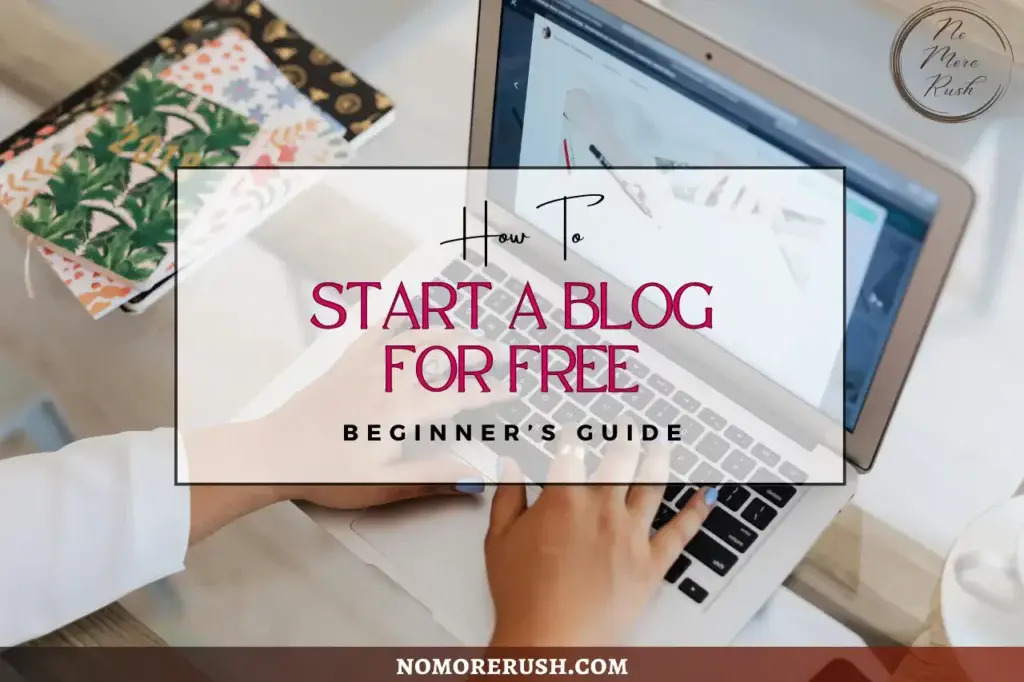
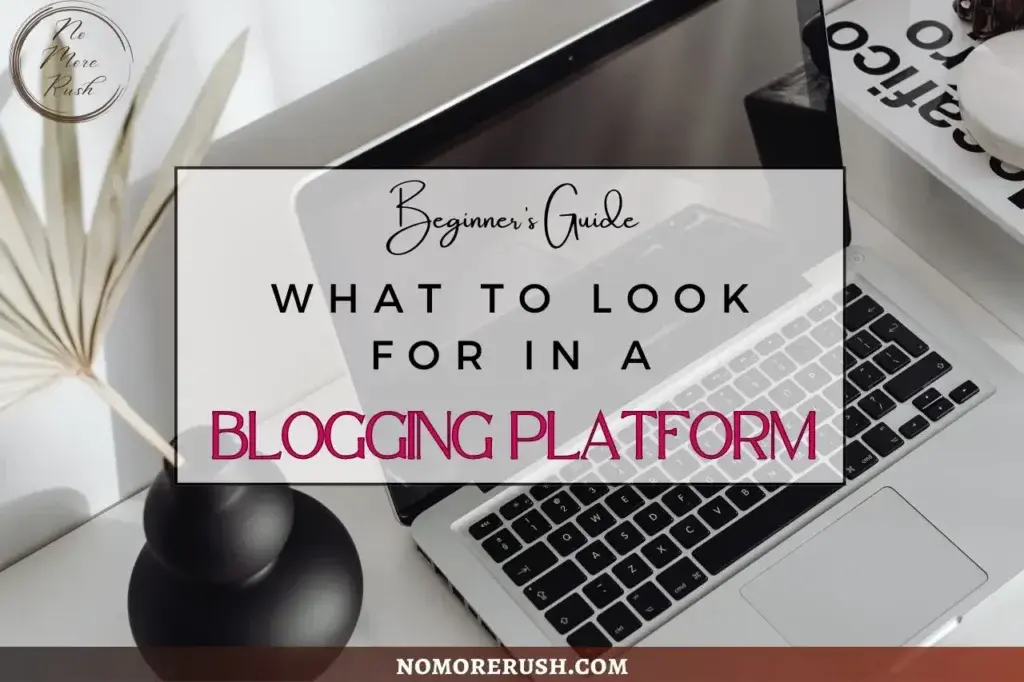
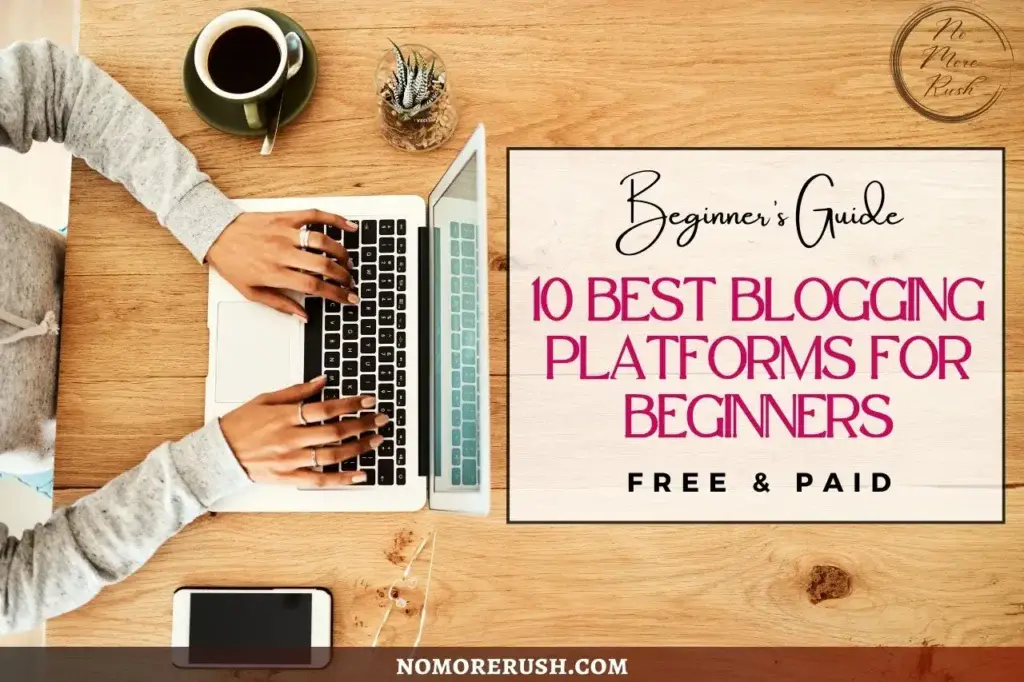
A great article that breaks down how to find a niche. This can be the hardest thing if you have no clue what to write about and as you say it’s important to write about things that are relevant to each other rather than random topics.
Many of us look at our hobbies and you’re right about saying that we should aim for hobbies that we have a passion for rather than choosing a niche because we think it’s popular. Nothing worse than choosing one that we run out of content to write about half way through.
Some great tips here that readers will find very useful.
Thanks Louise
It’s bad enough getting writer’s block when you’re writing about something you enjoy doing or learning but if it’s a topic you have no interest or knowledge in, it’s so much harder to get over that block.
I wonder how many websites have been abandoned over the years just for that one reason alone.
Thanks for sharing your thoughts.
This is a great article on how to choose a good niche for a blog Jessie. You have written this in such a thorough and informative manner that I don’t recall having this topic explained to me in easy to read terms.
I think a niche is important because you want to make sure it is something you are passionate about because you are going to end up doing a lot of work in this particular field whether you realize it or not.
I am curious in terms of changing your mind what niche you want to work in, if you decide to do another niche can you do that on your existing website or do you have to start all the way over again?
Hi Joseph
You’re so right. It sounds so easy in theory but once you start doing it, it becomes apparent very quickly just how much effort is required to run a website and keep it running.
There’s a lot of hard work involved and so much content writing, that it has to be something you really enjoy writing about otherwise you’ll burn out very quickly.
Many people burn out anyway when they’re writing about things they really enjoy let alone when they’re trying to write about topics that are of no interest to them.
In response to your question, It’s better to start a brand new website because your original site will have content relating to one niche and Google will already be familiar with that and your current rankings will also be a reflection of that.
If you start writing unrelated content on that same site, that will look inconsistent to Google (and your followers) and it could hurt your rankings, traffic and domain authority.
I would start a brand new site and either keep the old one as a part-time side hustle or if you’re completely done with that niche, sell it on and get some money back for all your hard work. Websites can be quite lucrative little assets.